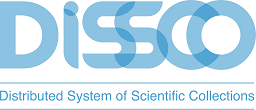Please use this identifier to cite or link to this item:
http://dx.doi.org/10.34960/332| Title: | DiSSCo Prepare Deliverable D4.2 - Future opportunities for DiSSCo's financial sustainability |
| Authors: | Briffa, Daniela Giuliano, Angele Lymer, Gaël Robertshaw, Steve |
| Keywords: | business development;business framework;business models;commercial activity;DiSSCo services;ERIC statutes;financial readiness;income diversification |
| Publication Date: | 2023 |
| Publisher: | DiSSCo Prepare |
| Citation: | Briffa, D., Giuliano, A., Lymer, G. & Robertshaw, S. (2023). D4.2 - Future opportunities for DiSSCo's financial sustainability. DiSSCo Prepare. https://doi.org/10.34960/vk0e-6t03 |
| Abstract: | This report provides a preliminary identification of users and of market niches for potential DiSSCo services, to provide recommendations for future scoping and capacity building. We summarize potential income diversification and the legal constraints on charging for services for DiSSCo-ERIC. Our compilation of the official statutes and annual activity reports of several ERICs, and the results of a consultation on the economic activities of eight ERICs, have shown the following: ● ERICs are encouraged to diversify their sources of incomes: It is fundamental for the sustainability of DiSSCo-ERIC to secure sources of income that will fund its activities in the long term. Ideally income streams will not only originate from European funding, and will be as diverse as possible. ● Two efficient ways to diversify the sources of income of ERICs are: 1. to create interactions and partnerships between the ERIC and different stakeholders, both in the public and private sectors, at several levels (International, European, national & regional) 2. to diversify the services provided by DiSSCo-ERIC and apply a charge to access them. Both measures should increase the visibility of DiSSCo-ERIC and favor securing diverse income streams. As long as the economic activities remain limited and do not jeopardize the achievement of the main tasks of DiSSCo-ERIC, there is no further constraint on charging for services in the legal texts framing ERICs. Other ERICs have not mentioned a maximum level of income from economic activities in their statutes, and it is suggested that DISSCo-ERIC aligns with them. Two ERICs have declared aiming for 5% of income from commissioned services. Other consulted ERICs do not have an aim in terms of income from commissioned services but some may develop one in the future. Therefore 5% of income from commissioned services constitutes a basis for a model for DiSSCo-ERIC. We recommend caution when deciding which users are charged for commissioned services. Our general recommendation is to not charge academic researchers, nor users from member and observer states (considering that the latter do pay an annual fee). Most ERICs charge users from other states and users from industry to access their services. The sustainability of DiSSCo-ERIC (encompassing income diversification) could be organized within a ‘sustainability plan’ that could include the measures presented above and could be developed during the construction phase of the DiSSCo-ERIC. Finally, we propose a Central Business Development team that would continue this work, trial some of the proposed business models, and manage a portfolio of income diversification projects and services. |
| URI: | https://know.dissco.eu/handle/item/526 |
| DOI: | https://doi.org/10.34960/vk0e-6t03 |
| Appears in the Folders: | DPP Work Package 4 - Business Framework |
Files in This Item:
| File | Description | Size | Format | |
|---|---|---|---|---|
| DPP_D4.2_final.pdf | 1.82 MB | Adobe PDF | View/Open |
Items in DSpace are protected by copyright, with all rights reserved, unless otherwise indicated.
